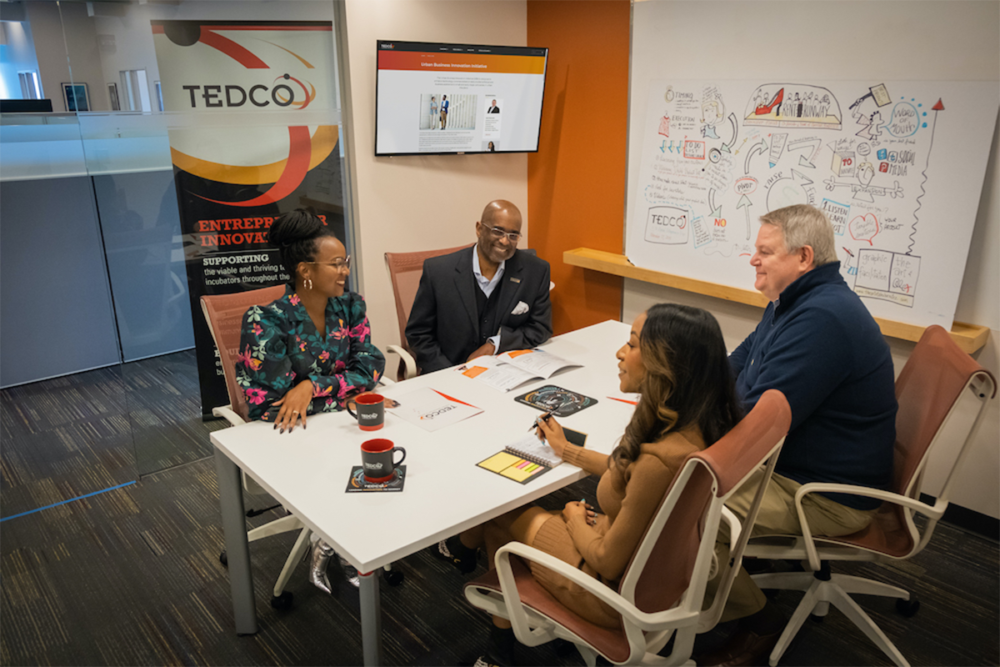When TEDCO CEO Troy LeMaile-Stovall officially took his position in September 2020, he immediately identified a disconnect in the Maryland business ecosystem.
He surmised that Baltimore City and Prince George’s County, two of the most populated areas in Maryland, were underinvested in and flat-out under-resourced. This lack of accessibility has been impairing minority entrepreneurs for many years.
LeMaile-Stovall formed the Urban Business Innovation Initiative (UBII) to help level the playing field. The UBII, which is piloting in those two regions right now, provides technical and business assistance to small and early-stage companies in cities across Maryland by connecting them with resources from all around the state.
“The reality of it was we weren’t really as deeply involved in those communities as we should have been, given their population and size within the state, so we thought it was important to have a higher level of intentionality,” LeMaile-Stovall said.
He began forming the UBII toward the end of 2020. Structuring the program was seamless as TEDCO simply mirrored the Rural Business Innovation Initiative (RBII), which had already been in place for years.
Essentially, the UBII runs through an adviser — Dr. Tammira Lucas, a West Baltimore native, who patrols the Baltimore City region.
“I came from the real West Baltimore, so the odds of me being anything outside of what I am today were against me every single day that I walked out the door,” Lucas said. “So giving people a chance to take the talents that we’ve already had and turn that into finances and building general wealth in their community, that’s significant.”
Uniquely, the advisers have full autonomy to provide assistance in the best way they see fit, as opposed to following a concrete guideline. Lucas said the lack of a regimented protocol allows her to help founders more efficiently since she can decide on the best course of action.
Founders essentially reach out to her as needed. Sometimes, the job is as simple as making an introduction for founders so they can collaborate with organizations. At other times, she must scour the Maryland ecosystem to find the most helpful fund or program available.
“Baltimore doesn’t lack resources,” she said. “What Baltimore does lack is the connecting of individuals to the resources that actually exist. So it’s my responsibility to connect them to help them scale, grow and get additional investment — whether that’s internally, with TEDCO or externally.”
This freedom to explore all avenues aligns with UBII’s primary purpose to increase access to as many viable resources in the robust Maryland ecosystem as possible.
“This is less a TEDCO program and more a means for TEDCO to leverage our relationships to make sure all the other elements of the ecosystem are visible, and that those who aren’t part of the ecosystem gain access to it,” LeMaile-Stovall said.
And exposing minority entrepreneurs to resources they wouldn’t normally have access to, rather than just providing direct funding, helps them build relationships with people throughout Maryland.
“The one thing with underrepresented founders that’s a constant issue is the network,” Lucas said. “We’re helping these individuals build their network. If we can help develop their network, that will take them probably further than any investment ever can give them.”
The UBII also provides this exposure to resources by directly partnering with organizations and programs. These “collaborative partners” assure that they’ll offer their services as needed if the advisers refer them.
Hutch, a 24-month business-to-government incubator program for companies that are looking to scale and work in the government contracting world, has served as a partner since November 2021. Program manager Stephanie Chin said the opportunity to assist new founders as they enter the Maryland ecosystem was too enticing to pass up.
“Sometimes, it’s really hard for folks to navigate the landscape, so I thought it was great for TEDCO to spearhead this and include us,” Chin said. “It was a great opportunity to be able to expand the reach of the technical assistance that a lot of our programs provide to entrepreneurs.”
And these partnerships are especially helpful for universities, since they can refer students to the program.
In January 2021, associate professor Dr. Ron Williams had just launched the Center for Strategic Entrepreneurship at Coppin State University (CSU), a state-of-the-art innovation hub for entrepreneurship research.
At the end of the year, Lucas — a former student of Williams’ — reached out to him about working with the UBII. He figured it fit perfectly with the work he was doing.
“They knew we’d be interested in startup technical assistance because that’s within our economic development pillar,” he said. “We knew we could be an outlet for the kind of support they provide, so there really was an alignment.”
So far, CSU’s primary contribution has been offering assistance with getting a real estate license. But Williams said he hopes to provide a wide variety of startup assistance as he builds out his research center.
“The ability to dedicate some resources to entrepreneurs of color is fulfilling,” Williams said. “We can have a big impact on economic mobility.”
Moving forward, LeMaile-Stovall said he hopes to expand this program to Howard County and Montgomery County.
“When I think about inclusivity, it’s not just about gender or race,” he said. “It’s also about geography. We have to change the wealth equation so that we’re including those who have been excluded and expanding to those who have been marginalized.”







